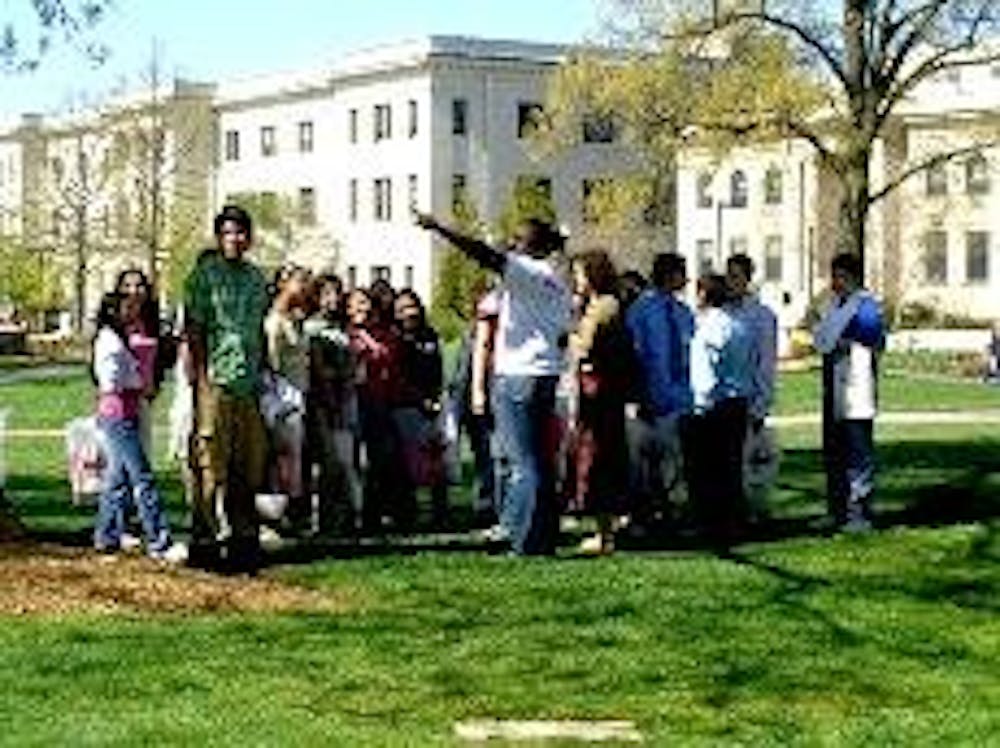When Laisa Daza, a senior in the School of International Service, came to the United States from Bolivia with her parents, she was about 10 years old. To get where she is today, she did what all students had to do: Apply to college.
"When I was applying for college, nobody around me knew about the college application process," Daza said. "My parents didn't know, and it was just me and my friends figuring it out."
Other high school students experience the same problem. That's why Daza, the recruitment chair for the 9th Annual Latino Youth Conference (LYC), along with Logistics Chair Amanda Qui¤ones, a junior in SIS, have set out with the Latin and American Students Organization (LASO) to help students. LASO's student-led conference emphasized college preparedness to nearly 130 Latino high school students from around the Washington, D.C., Maryland and Virginia region on campus last Saturday, shedding light on the demanding, education-oriented job market they will one day face.
As of 2003, the high school dropout rate for Latino students is 21 percent, more than twice the national average of 10 percent, according to the Pew Hispanic Research Center. The LYC acted on this statistic, hoping to change the course of education for Latino high school students. Although it is mainly geared toward Latino students, the LYC highlighted issues most students must face, including paying for college, choosing appropriate careers and meeting the challenges of an increasingly changing society. The conference taught the students how to use resources like brochures and the Internet to enter college and reach their maximum potential. Latino professionals and alumni spoke to them in several workshops.
"It's important to provide role models because pretty much what they see are stereotypes of Latinos and what Latino students should be," Daza said. "They don't see how they can use these resources and make something of themselves and be the best they can be."
U.S. Treasurer Anna Escobedo Cabral was the conference's featured keynote speaker. As the highest-ranking Latino in the U.S. Department of Treasury, her signature can be found on all recently printed U.S. currency.
"Today, you're living in a society that increasingly demands higher levels of skill and education," Cabral said. "The job growth is happening in information age [and] services sectors. People require of you - if you want to be successful, if you want to buy that brand new house, if you want your kids to go to college, want to have a nice car, nice things around you - people require you to educate yourself well."
Cabral, who attended Harvard University, also discussed the issue of financing a college education. She explained how borrowing money can be hard, but rewarding.
"By the time I got to Harvard, I was borrowing all the money I needed to go to university," she said. "But I knew it was the most important investment I would make in my life. My friends would have easily borrowed for a new car. That new car went down in value the second it went off the lot. My education has been incredibly valuable and increases overtime, so this is something worth borrowing for."
The conference's workshops, such as "College 101: Making it Happen," explained the nuts and bolts of college. But the workshops also aimed to empower the students and to prepare them for the real world.
"We are educating Latino youth for diversity in all fields and in all top management positions," Vanessa Rodriguez, an AU alumna and a graduate student in the Washington College of Law, said to students in her workshop titled "Exploring Your Options."
"We want to give you guys an opportunity to challenge yourself and to grow - understand how the world really is," Rodriguez said. "The world is not like the communities we live in."
Some Latino students have the opportunity to be the first generation college students in their families, which serves to empower them as well.
"My mother didn't go to college at all," Qui¤ones said. "My father has an associate degree, but he got it in his 30s, so it wasn't a staunch education. I was the first one to go to school and I went to change the pattern in my family and to prove that we could do it."
At the time of its inception in 1999, only 12 students attended the conference. Despite such a small turnout, the conference persisted. It became one of the most important events for LASO, Codirector Jennifer Arboleda, a junior in the School of International Service, said at a LASO general meeting.
The conference continues to be steadfast.
"This year's conference is an improvement," John Riley, a volunteer at LYC and a senior in the School of Communication, said. "It's more comprehensive and more organized. It used to be a lot smaller, but the fact that it is growing every year is a testament to how it's improving."
Riley previously volunteered at the LYC in 2005.
"I like it," he said. "It's giving back to the community. I've always been taught that you don't forget your roots and you should give a genuine hand back to the community."
Volunteers of the LYC set up conference equipment, helped with registration and led students to the different workshops. For volunteers, the day began at 8 a.m., but the early wake wasn't excruciating.
"It's a beautiful thing," Isel Aimee, a freshman in the Kogod School of Business, said. "You're helping out these kids, especially when they're in high school. It's exciting to see their faces."
The conference will occur again in spring 2008.
"[The conference is] very dear to our hearts and we hope the 10th year is just as big ... so we can reach out and make it a real milestone. We're looking towards the future," Qui¤ones said.





